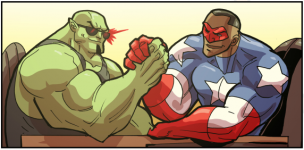The world of tabletop gaming is largely overshadowed by the classic Dungeons and Dragons. With this comes the idea and stigma of enthusiastic nerds playing a game with overly complicated rules. Coincidentally, this same stereotype can be applied to Eve players, something in which I wholeheartedly embrace. Therefore I will plunge headfirst into the realm of tabletop gaming and share with you my thoughts of one of the lesser know RPGs, Prowlers and Paragons. This is a superhero style game that evokes the feeling of playing out your own comic book adventure.
The Basics
The most common system of gameplay for tabletop games is called d20. This comes from the use of twenty sided dice, as well as others, to determine the outcome of actions within the game. Prowlers and Paragons uses a much simpler system that consists of using only your basic six sided dice. It is a very light on the rules, providing just enough structure to guide the players without becoming overbearing. This makes it easy for people new to tabletop games to pickup.
Players put points into traits to determine the number of dice they get to use, essentially the strength of the skill. Then, when they take an action, they roll the number of dice the correlates with a given skill. Every time they roll an even number, it counts as a success. Rolling a six counts as a success plus you get to roll that die again. Next, you subtract the difficulty from the number of successes the player rolled. If the player gets fewer than zero net successes, that means they failed and the enemy/other player/game-master decides what happens. Exactly zero net successes means they failed, but they can add one minor embellishment to the outcome. One net success is the reverse of zero, the player succeeds and tells the story, but one embellishment is added by the other side. Two or more net successes allows the player to have complete control of the action and how they wish to narrate the story.
Customization
In the world of superheroes, there are the standard powers and there are the custom ones that people like to make up. One of the first questions someone with a really active imagination is if the game can accommodate their unique ideas for powers. I am confident that at least 90% of those strange ideas can be defined using the existing guidelines. For example, someone joked about wanting the power to know where the nearest fish tacos were located. While this produced a lot of laughter and more kidding around, I was struck with curiosity as to the limits of the game. As it turns out, there is sufficient structure to design just such a power. It would be called Limited Always-On Scrying for fish tacos. How do you like that for a plot point?
My Game
The first session of my game consisted of a lot of the usual setup that most games require. Our group was introduced to each other and we were given a brief overview of the world. All of us had made our characters before hand which drastically cut down on the time it took to get going. We shared what our characters looked like to give everyone a mental image and were told where they were located (We settled on a fish taco restaurant in an airport, eat at your own risk). From there we began to figure out our character’s relationships to each other and what each of us were thinking about doing. Then we moved forward and set out on our adventure that promises to have lots of good times and maybe even some fish tacos.

The Pros and Cons
Pros
- Very rules light
- Plenty of room for quirky ideas
- Flexibility of gameplay and customization
- Cheap (Currently $4.95 for the core rule book)
Cons
- No fillable PDF character sheet
- Limited chance for expansions
- Very small community/Difficult to find players

